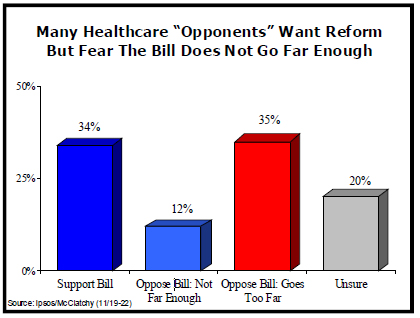Listening only to Republican members of Congress, one would be led to believe the American people are overwhelmingly opposed to health care reform. Sen. Mitch McConnell recently said, “I haven’t seen a survey in months, in months, by anybody that indicates the American people are for this bill… What I hear the American people saying to us: Vote for this bill, and you’ll be history.”
At first blush, they appear to be correct. However, a deeper look into the polling numbers tells a very different story. In a memo obtained by POLITICO, the Mellman Group dives into the numbers and explains what’s really going on.
Mellman explains:
[P]ublic poll analyses often ignore the fact that a chunk of opposition to the current plan comes from those who support reform, but would like to see Congress go further. A late-November AP/Ipsos poll found nearly identical numbers in favor of the bill (34%) and opposed (35%), without describing its content. A crucial 12% initially say they oppose the plan, but told pollsters their opposition was based on their belief that it did not go far enough. So what initially appears to be a 12-point margin against reform is actually an even division.
In the graphic below, Mellman shows that 46% of Americans either support the current bill or want it even stronger (which is the exact opposite of the Republican Party’s position). The 35% of Americans opposed to the bill, and who believe it goes too far, are in line with the GOP.

As you can see, Americans want comprehensive health care reform. Around 25% of the people opposed to the current bill simply believe it should do more. So while these respondents’ polling responses are often lumped in with conservatives’ opposed to the bill, in reality, they’re further to the left than those who support the bill.
By playing with numbers, Republicans would have you believe the public supports their obstruction.
The polls show they’re wrong.
Join us in defending the truth before it’s too late
The future of independent journalism is uncertain, and the consequences of losing it are too grave to ignore. To ensure Truthout remains safe, strong, and free, we need to raise $43,000 in the next 6 days. Every dollar raised goes directly toward the costs of producing news you can trust.
Please give what you can — because by supporting us with a tax-deductible donation, you’re not just preserving a source of news, you’re helping to safeguard what’s left of our democracy.